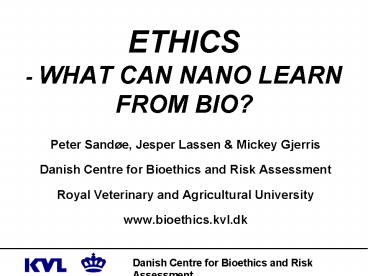ETHICS WHAT CAN NANO LEARN FROM BIO - PowerPoint PPT Presentation
1 / 19
Title:
ETHICS WHAT CAN NANO LEARN FROM BIO
Description:
Peter Sand e, Jesper Lassen & Mickey Gjerris. Danish Centre for Bioethics ... sign of real problems they may be used to claim the irrationality of the critics ... – PowerPoint PPT presentation
Number of Views:37
Avg rating:3.0/5.0
Title: ETHICS WHAT CAN NANO LEARN FROM BIO
1
ETHICS- WHAT CAN NANO LEARN FROM BIO?
- Peter Sandøe, Jesper Lassen Mickey Gjerris
- Danish Centre for Bioethics and Risk Assessment
- Royal Veterinary and Agricultural University
- www.bioethics.kvl.dk
2
AIM OF THIS TALK
- Many reports point to the need of bringing
ethical concerns to bear on the development of
nanotechnology already in the research phase - Often a comparison is made with the development
of modern biotechnology in the area of food and
agriculture - But the question is What can nano learn from
bio? - To answer this question is the aim of this talk
3
WHAT DO WE MEAN BY BIO?
- Biotechnology understood as the use of biological
organisms to produce products and services is old
and well established - Even gene technology is well established and
hardly controversial in some areas, e.g. the
production of medicines and enzymes - However, when we here talk about bio we mainly
refer to the use of gene technology in
agriculture and food production
4
NANO AND BIO - WHAT DO THEY HAVE IN COMMON?
- Emerging technology
- Science based
- Strongly supported by public funding
- A lot of hype
- Few products on the market
- Potential for scare stories (Frankenfood / Grey
goo)
5
(No Transcript)
6
(No Transcript)
7
THE ROLE OF SCARE STORIES
- They may affect sensitive people (like Prince
Charles) - But they may also prevent those who are in favour
of the technology in question from taking their
critics seriously - Rather than seeing the stories as a sign of real
problems they may be used to claim the
irrationality of the critics
8
WHAT NANO CAN LEARN FROM BIO (1)- BE AWARE OF
THE RISK WINDOW
- From the outset biotechnology was regulated on
the basis of assessments of risks to human health
and the environment - However, controversies have so far led to a
greater awareness of potential hazards - In EU regulation of biotechnology there has been
a growing awareness of the risk window - Also there has been an increased awareness of
scientific uncertainty
9
NANO AND BIO MAY HAVE MORE IN COMMON THAN SOME
PEOPLE THINK
10
WHAT NANO CAN LEARN FROM BIO (2) - BE AWARE OF
DIFFERENCES IN RISK PERCEPTION
- Often it is assumed by experts that lay peoples
view on risks from new technology is just a
distortion - However, the lay view may reflect a focus on deep
uncertainties (the unknown unknowns) - And it may reflect a different conceptualisation
of risk
11
EXPERT AND LAY VIEWS OF RISKS
- Experts in risks to human health or the
environment will typically view a risk as a
one-dimensional affair - Risk effect probability
- For lay persons risks have several dimensions
- uncertainty
- dread
- catastrophic potential
- controllability
- fairness
12
WHAT NANO CAN LEARN FROM BIO (3)- CONSIDER
SERIOUSLY WHAT IT IS GOOD FOR
- Part of the explanation of why food biotechnology
was so badly received by the public is that
ordinary people could not see what was in it for
them - Those who developed the technology either took
the benefits for granted or focused on benefits
for others than the end consumer - In discussions about benefit it is important to
avoid hype
13
HYPE
14
HYPE
15
WHAT NANO CAN LEARN FROM BIO (4)- BE OPEN TO
OTHER MORAL ISSUES
- One of the results of studies of biotechnology
and the public was that the public put great
emphasis on moral issues besides risk and benefit - These include
- Justice
- Democracy
- Respect for nature
16
WHAT NANO CAN LEARN FROM BIO (5)- TRUST MATTERS
- One of the issues that has emerged following the
controversies about food biotech is a problem of
trust - This problem seems to be generated by several
factors - Growing involvement of science with commercial
interests - Patenting
- Growing gap between science and society
- Nano cannot avoid the problem completely
17
(No Transcript)
18
LACK OF TRUST IN SCIENCE
19
WHAT NANO CAN LEARN FROM BIO (6)- THE MAIN
MESSAGE
- In the development of nanotechnology it is
important not to take for granted what are the
concerns and hopes of those who one way or the
other are going to pay for it - Rather it is important to have an open eye
towards other isssues than health and environment - This may require research by social scientists
and philosophers - And a willingnes to engage in an
interdisciplinary effort































